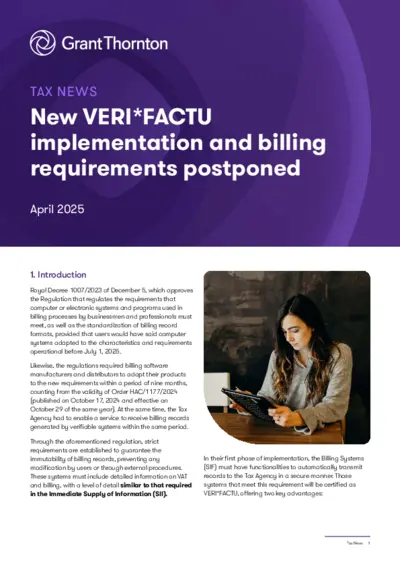
The regulation also required billing software developers and distributors to adapt their products to the new requirements within nine months from the effective date of Order HAC/1177/2024 (published on October 17, 2024, and effective as of October 29 of the same year). At the same time, the Tax Agency had to enable a service to receive billing records generated by verifiable systems within the same period.
This regulation sets out strict requirements to ensure the immutability of invoice records, preventing any modification by users or external procedures. These systems must include detailed information on VAT and invoicing, similar in detail to what is required in the Immediate Supply of Information (SII) system.
In the first implementation phase, Billing Systems (SIF) must include functionality to automatically and securely transmit records to the Tax Agency. Systems that meet these criteria will be certified as VERI*FACTU, offering two key advantages:
- Verification by recipients: through scanning QR codes or accessing URLs on electronic invoices via the Tax Agency’s online portal.
- Administrative oversight: allowing the Tax Office to audit records in real-time.
The Tax Agency is planning a second phase where the obligation to submit invoice records will be extended to all taxpayers, thereby expanding the fiscal reporting model, similar to the SII system, across the entire business fabric. This approach aims to standardize tax control and significantly reduce discrepancies and fraud in invoicing.

Modifications introduced by Royal Decree 254/2025, published on April 2, 2025:
However, Royal Decree 254/2025, published in the Official State Gazette (BOE) on April 2, introduces significant changes by postponing the implementation deadlines for the electronic invoicing regulation. The new calendar is as follows:
- Corporate Income Tax taxpayers: must have their systems adapted by January 1, 2026.
- Other obligated taxpayers: will have until July 1, 2026 to complete the necessary adjustments.
- Must offer updated versions compliant with the regulation by July 29, 2025 (nine months after the entry into force of Order HAC/1177/2024 on October 29, 2024).
- The service for receiving billing records from verifiable systems must also be operational by July 29, 2025.
These deadlines aim to facilitate an orderly transition to the new electronic invoicing model.
At this point, it is important to note that the obligations mentioned will not apply to taxpayers who already voluntarily or mandatorily use the Immediate Supply of Information (SII) system.
This exemption has been implemented to avoid placing a disproportionate administrative burden on affected businesses. Moreover, the Tax Administration considers the existing control mechanism via the SII system sufficient, as providers already report their invoices. This information flow allows authorities to carry out monitoring and verification with the required traceability, making additional obligations redundant for this segment of economic operators.
Spanish B2B E-invoice approved under Law 18/2022 of September 28:
Likewise, the Government continues to make progress in implementing the Spanish B2B electronic invoicing system, parallel to the new Billing Information Systems (SIF). The obligation for B2B electronic invoicing was established under Law 18/2022 (Crea y Crece Law) of September 28.
Recently, in March 2025, the Government introduced changes to the draft Royal Decree that develops this system and launched the process to draft the ministerial order that will define its technical specifications.
The start of the mandatory B2B electronic invoicing will now depend on the approval of this ministerial order, whose development has recently begun. The implementation deadlines will be:
- Companies with annual turnover over €8 million: 12 months after the ministerial order enters into force.
- All other companies: 24 months after the order becomes effective.


